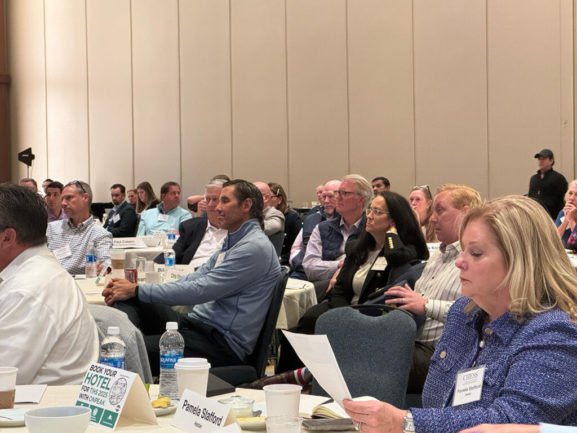Carl Wurzer Interview: Brushware Anniversary

As part of our 125th-anniversary celebration, Brushware is offering an article related to the history of the magazine in each edition for 2023. For our second installment in the series, we have the following interview with former magazine owner, Carl Wurzer.
Age: 83
Current Location: Harrisonburg, Virginia
Role with Brushware: Owner from 1976 to 1999
Can tell us about how you acquired Brushware?
I went into the print broker business in 1974. I realized at that time I could get a $1,000,000 policy for my wife Andra and the two children but how far will that go? I always had in the back of my mind to go ahead and get a publication. So this fellow, Walter Grimes, had an office in the National Press Building and I would stop in every so often. Of course, some of the prices for the publications were way beyond my means.
One day I stopped in and Walter said, ‘Something just crossed my desk the other day. This could be something you might want to take a look at.’
So I got the information from him and called the owner Chuck Baldwin. At that time Baldwin was living in Bernardsville, New Jersey, so it was only maybe about a three-hour drive for us. We went up and went through the financials. Our CPA, Jay Fielding, said everything is pretty much in sync with the tax returns. So I said, ‘Okay, fine, we’ll go ahead with it.’
The whole idea behind getting the publication in 1976 was so that Andra would have something to work with or have an income from, rather than just the policy because the print broker business was basically all up in my head. So that’s how it got started.
What was it like in the early days of running the magazine?
When it started, a fellow by the name of William Magnus did the editing of freelance articles. He had his own ad agency and we had known each other for a number of years. I told him what was going to happen and he said, ‘That’s fine, I can go ahead and edit it.’
We sent it up to a fellow by name of Frank Kotkamp, in Brattleboro, Vermont, who did the typesetting. We were on our way up to New England for some reason and I suggested to Andra to stop off and see Frank. When he opens up the door to his apartment, it slams right into the composing machine. He said, ‘Well, that’s the only place we could fit it.’ So, he had this typesetter right there in the middle of his living room. He was good. He did ballet on the side and was so nimble. You never really had to proofread his material, I mean, that’s how clean
it was.
Bottom line was that I felt after about a year and a half with the people we had working on it, Andra could basically run the publication on her own. At that time, we had the writers John Perry and Gerson Goodman. All of the suppliers were good.
I was still basically on the road three days a week, mainly in the Washington D.C. area because we lived in Potomac at that time. During the week Andra would lay out the magazine and was really running the show from that point. I still handled the advertising. Once again, as I say, it was like clockwork, we didn’t have any contracts with anybody. It was just you know, a handshake or a phone call. ‘Yeah, go ahead, keep running our ad.’ You know that kind of a thing.
What do think about the current state of Brushware?
I see you have not dropped the quality of the paper, that’s good. As soon as I took the publication over in 1976, that was one of the first things I did. I went to a 60# coated stock for the paper and also went to a 70# coated cover versus what it was before. Baldwin … was a character. I had a five-year payout with him and when I made the last payment, I brought the final check to him and said, ‘Well Chuck, I won’t be seeing you any further or having any communication, we’re all said and done.” And he looks at me, didn’t thank me for making sure that he received his money on a monthly basis, but he says to me, ‘Well, I just probably sold it too soon.’
If you could have seen the publication before and then after we got it, it was like night and day.
From a day-to-day perspective, what was your favorite part of working on Brushware?
We had a good stable of advertisers. I mean it was like clockwork and that was one of the best parts of the whole thing. The other part that was always interesting was the writers. There was a publication called Editor & Publisher that came out on a weekly basis. They had a big classified section in the back with writers and publishers looking for writers and I think that’s how we came across Bob Lawrence. At that time, the ABMA had two meetings, one in the fall and one in the spring. The one in the fall was usually in an industrial state and the one in the spring was always held in Florida, either at the Breakers or Boca Raton. Later they started to migrate out to the West Coast on that one.
We had a fellow by the name of Gerson Goodman, who also was one of our writers. After we had a trip out to the West Coast and took the red-eye special back, I get a phone call from Gerson and he says, ‘Carl, I’m telling you right now, that’s the last time I’m gonna be doing this. You better find somebody else.’
Bob Lawrence had already been working with us. I had him going around the country to the different brush manufacturers. Then what we did is I would send him out a copy of the subscribers so when we were going to the spring or fall convention, we would go ahead and look in the area for manufacturers or suppliers. That’s how we did the profiles. Our lead article at that time was always of somebody in the brush industry.
We also had another fellow by the name of Bruce Gebhardt, who has since passed away, a victim of Agent Orange in Vietnam unfortunately. He was an excellent writer, beyond belief. He really had connections at the Commerce Department and knew what was going on with the different sessions with imports and exports.
What would you consider to be the strength of Brushware during your time with the magazine?
I think the strength overall was simply the writing. We had a reporter in Japan, who, we eventually found out wound up in Tokyo because he had no money. He was good and did good reporting for us. We had Goodman who was out of New York, and of course, he did a lot of the reporting of the conventions. Another fellow that we had was John Perry. We found him through Editor & Publisher. He wrote for different publications like U.S. News and World Report and a few others. He spoke Swiss, German, Spanish and Italian. He was an excellent, excellent writer and would do the conventions for us over in Europe. He covered Interbrush and the European Brushware Federation, so then we would go ahead and have him do interviews with some of the manufacturers.
Is there anything about working on Brushware during your time that would you think would be a surprise to the readers?
I did have some favorable comments on what/where Bruce would be covering, regarding the imports and exports. He would also be down at the Commerce Department interviewing people there. I think people were pleasantly surprised at the coverage. We would go ahead and give it the importance that we thought brush manufacturers deserved. So we did have a good response — they really appreciated that.
Do you have any thoughts or comments overall on the 125-year anniversary of the magazine?
Well, Andra and I both feel a little bit down that the back issues are gone. Every couple of years I would take it to a library bindery and I’d have them bound up and have the volume number put on and the year and Brushware and the whole nine yards. There were a couple of volumes missing, but the first one that really stuck out was the one from 1898 when they first came out compared to where we took it.
It’s just a shame because what we also did is in the July/August issue I would run what we called the nostalgic section and I would put a 10 or 15 percent yellow tint behind it. We would do four to eight pages depending on how the space went. I would go back to let’s say 1925, 1920 or 1930. The same things that you hear today from the manufacturers you heard back in 1925, ‘Can’t get good help, raw materials costing too much.’


